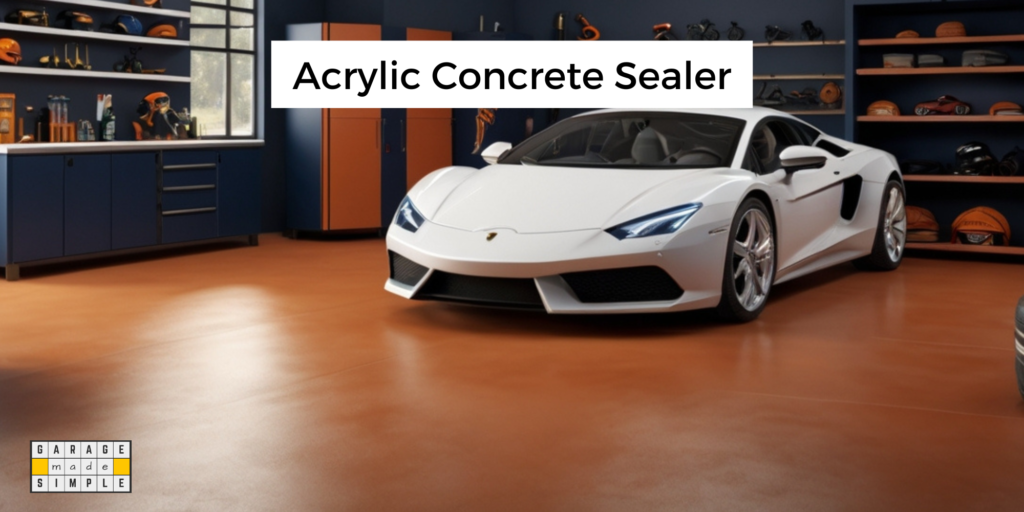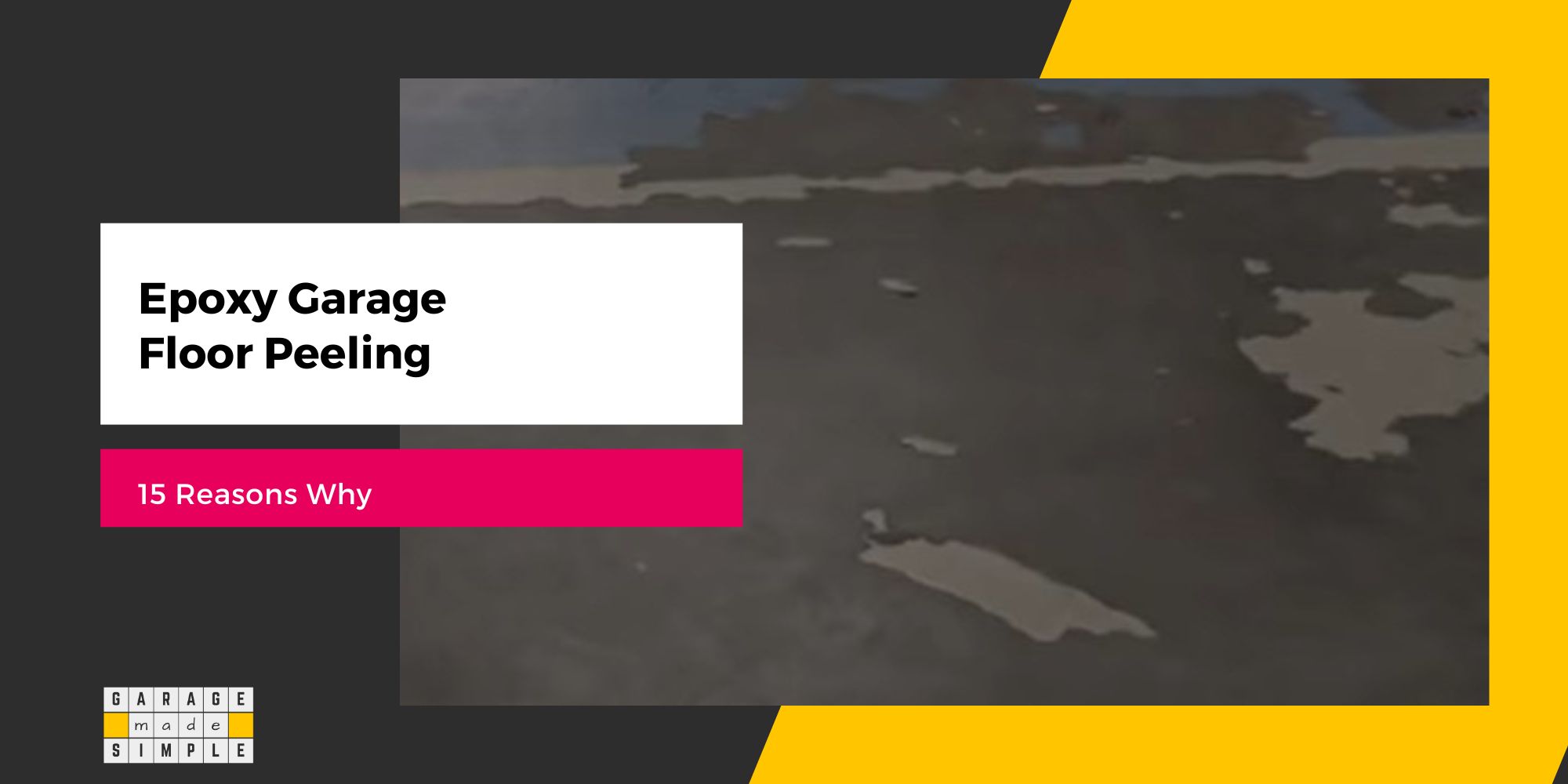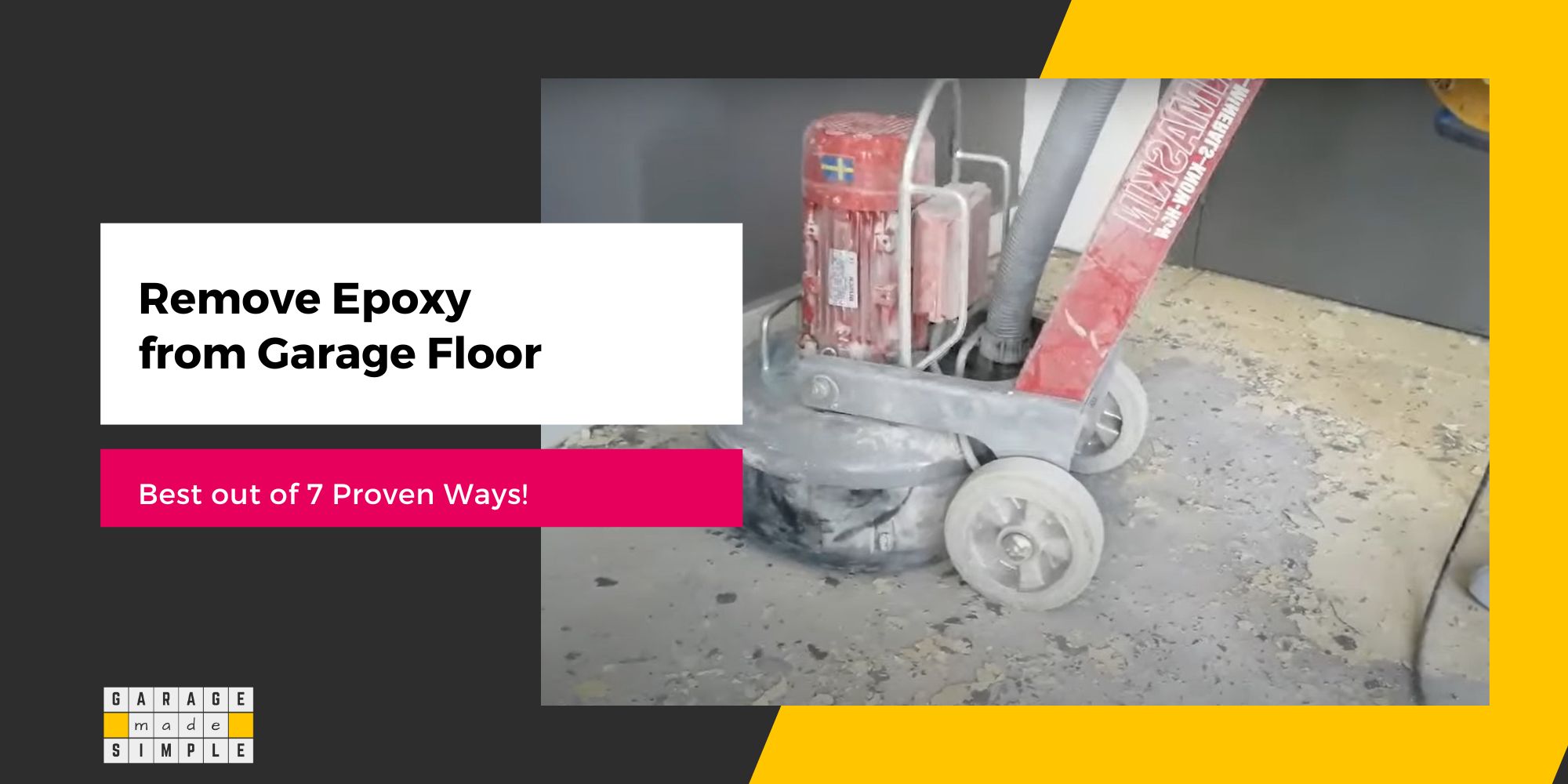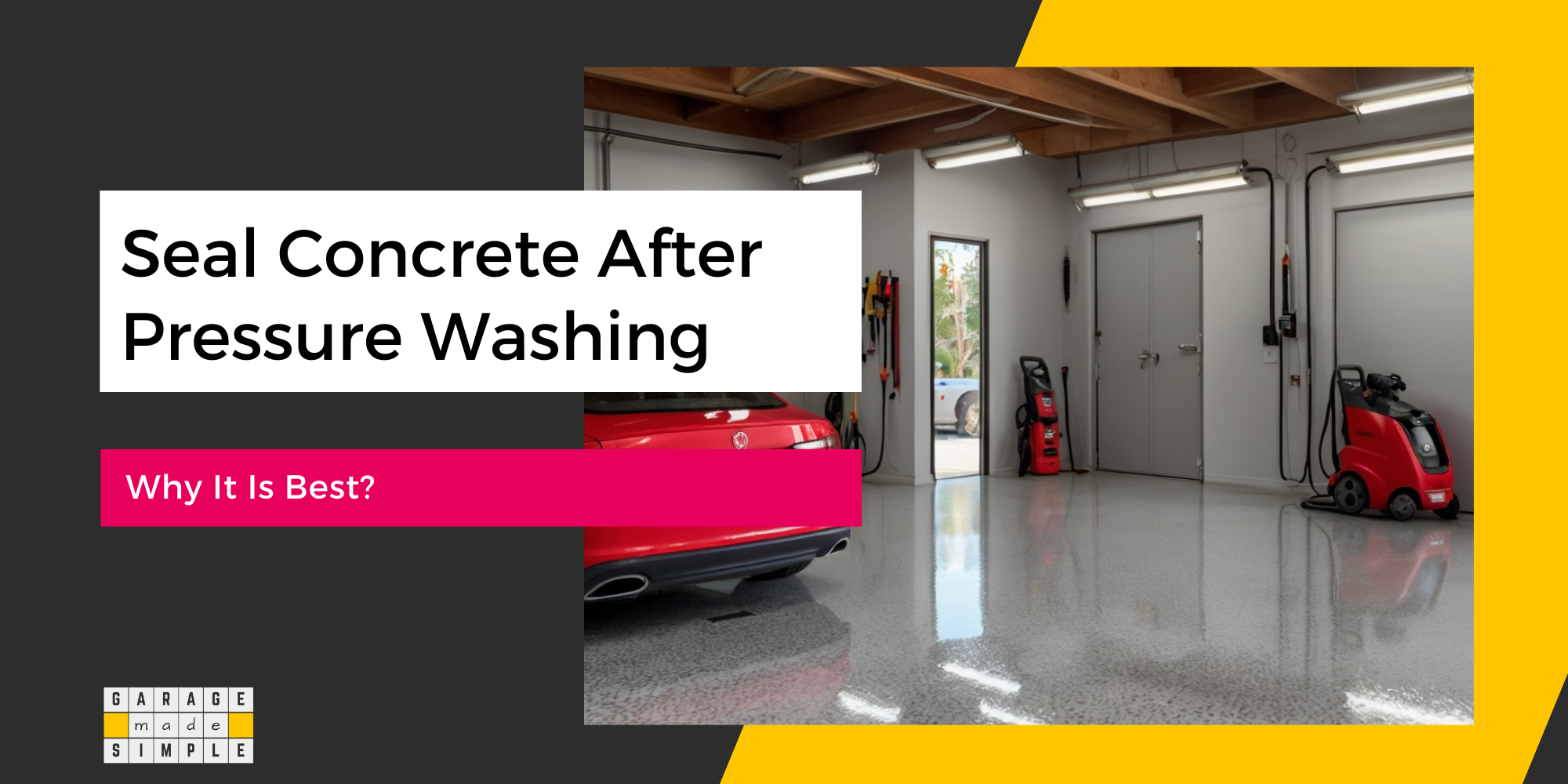Acrylic Concrete Sealer: A Comprehensive Guide [2024]
As an Amazon Associate, I earn from qualifying purchases.
Acrylic Concrete Sealer is quite likely to cross your mind if you plan to seal your garage floor.

Acrylic concrete sealers are popular as they offer several benefits over epoxy, polyurethane, and penetrating sealers. They provide a breathable, UV-resistant finish that prevents yellowing and peeling.
Acrylic sealers are cost-effective, require minimal surface preparation, are easy to apply, and dry quickly. They can be water-based or solvent-based. Recent developments and legislation ensure they have relatively low VOCs.
What is an Acrylic Concrete Sealer?
An acrylic concrete sealer is a protective and decorative coating for concrete surfaces.
Acrylic resin is the main ingredient in the formula. Acrylic resin is a group of thermoplastic or thermosetting polymers derived from acrylic acid, methacrylic acid, or other related compounds.
Acrylic resins are known for their transparency, durability, and resistance to UV light, weather, and chemicals.
Acrylic resin sealers can be water-based or solvent-based, depending on the carrier solvent used in their formulation. Water-based acrylic sealers are eco-friendly and have low VOCs. Solvent-based sealers are tougher with a glossier finish.
Benefits of Using Acrylic Sealers: Acrylic sealers enhance the appearance, protect against stains, and resist UV damage. They are easy to apply and maintain, making them ideal for driveways, basements, and garages.
Suitability for Different Concrete Surfaces at Home
Garage Floors
An acrylic concrete sealer is ideal for garage floors due to its durability and stain resistance. The sealer protects the floor from oil spills, chemicals, and tire marks.
An acrylic concrete sealer increases the floor’s longevity and also gives your garage a polished, professional look.
Patios
An acrylic concrete sealer is great for patios as it provides excellent UV protection and weather resistance. It prevents the concrete from fading and deteriorating under harsh sunlight and inclement weather conditions.
And of course, they enhance the appearance of decorative concrete, making patios visually appealing.
Basement Floors
An acrylic concrete sealer is a must for a basement floor. It provides the crucial moisture resistance, preventing water seepage and mold growth. Your basement is less likely to feel damp, and musty.
In essence, an acrylic concrete sealer on the basement floors promotes a healthier indoor environment and air quality. The sealer also adds a layer of protection to the concrete, extending its lifespan.
Driveways
Acrylic sealers are highly effective and beneficial on concrete driveways. They protect the driveway against freeze-thaw cycles and deicing salts.
This prevents cracking and spalling, ensuring the driveway remains in good condition. Additionally, they enhance curb appeal by giving the driveway a clean, well-maintained appearance.
How to Choose the Right Acrylic Concrete Sealer
The choice of the sealer depends on the surface type, location, and use.
Choose a durable, high gloss, solvent-based acrylic concrete sealer for high-traffic areas like driveways. For stamped concrete patios, choose a low gloss, solvent-based acrylic sealer to enhance the appearance.
As driveways and patios are not enclosed areas, a solvent-based sealer, is acceptable, even desirable. When it comes to enclosed areas, such as basements and garages, low-VOC, water-based acrylic sealers are a better choice.
The UV resistance of the acrylic sealer is critical for exposed surfaces such as driveways and patios. On the other hand, it may not be an important requirement for basements or garages.
In the same way, moisture resistance is critical for basements but less important for driveways.
Best Acrylic Concrete Sealers for Different Applications
1. Concrete Garage Floor
Armor WB25 High Gloss Wet Look Concrete Sealer
- Professional-grade water-based sealer
- Slight color enhancement for surfaces
- Long-lasting, non-yellowing high gloss finish
- Ready-to-use; easy roller or sprayer application
- Low odor, low VOC, suitable for interior use
- Aids in proper curing for new concrete
- Versatile use on various concrete surfaces
- Formulated for all 50 states
This sealer has low VOC and low odor making it suitable for interior use. Moreover, it is water-based, easy to handle and apply, and dries fast.
It provides a durable, low-gloss finish that enhances the appearance of your garage floor. It also protects the floor from oil spills, chemicals, and tire marks.
2. Basement
Armor AR500 High Gloss Wet Look Concrete Sealer
- Professional-grade concrete & paver sealer
- Dramatic color enhancement for surfaces
- Long-lasting, non-yellowing, high gloss finish
- Ready-to-use; easy roller or sprayer application
- Easy maintenance; self-priming formula
- Versatile use on various concrete surfaces
- Available in formulations for all 50 states
This sealer is perfect for basements due to its high gloss finish and excellent moisture resistance. It prevents water seepage and mold growth, ensuring a healthier indoor environment.
3. Stamped Concrete Outdoor Patio
DOMINATOR LG+ Clear Acrylic Sealer
- Protects concrete pavers, not stone or clay
- Coverage: 250-400 sq ft per gallon, per coat
- Water-based, low VOCs, no harsh odors
- Easy spray-on application with quick drying
- One-day project with fast coat drying time
This low gloss paver sealer enhances the color and appearance of stamped concrete patios. It provides UV protection and weather resistance, ensuring the patio remains visually appealing and protected from the elements.
4. Concrete Driveway
Masonry Defender Concrete Sealer for Driveways
- Invisible, non-glossy concrete protection
- Water-based sealer repels moisture effectively
- Shields driveways from pitting and cracking
- Easy spray application; covers 90-150 sq ft/gal
- Penetrating sealer keeps surfaces breathable
This water-based silane/siloxane sealer offers deep penetration and excellent protection against freeze-thaw cycles and deicing salts. It enhances the driveway’s durability and appearance, making it a cost-effective choice.
Step-by-Step Application Guide
Preparation
Cleaning and Repairing the Surface
Start by thoroughly cleaning the concrete surface. Remove any dirt, oil, or debris using a pressure washer or a stiff brush and a suitable cleaner.
Repair any cracks or holes with a concrete patching compound and allow it to cure completely.
Tools and Materials Needed
Gather the necessary tools and materials: acrylic concrete sealer, roller or sprayer, paint tray, protective gear (gloves, goggles), and a broom or vacuum for final cleaning.
Application Process
Detailed Instructions for Each Surface Type
For garage floors, apply the sealer using a roller for even coverage. For patios, use a sprayer for a more uniform application on decorative surfaces.
For basement floors, ensure the area is well-ventilated and use a roller. For driveways, use a sprayer and apply the sealer in sections to avoid overlap marks.
Tips for Achieving a Smooth, Even Finish
Work in small sections to maintain a wet edge and avoid lap lines. Apply thin, even coats and allow each coat to dry before applying the next.
For best results, follow the manufacturer’s instructions regarding the number of coats.
Curing and Maintenance
Drying Times and Conditions
Allow the sealer to dry according to the manufacturer’s recommendations, typically 24-48 hours. Ensure the area is protected from foot traffic, vehicles, and moisture during this time.
Regular Maintenance Tips to Prolong the Life of the Sealer
Regularly clean the sealed surface to remove dirt and debris. Reapply the sealer every 2-3 years or as needed to maintain its protective properties.
Avoid using harsh chemicals or abrasive cleaning tools that can damage the sealer.
Troubleshooting Common Problems
Blistering
Blistering occurs when air or moisture is trapped under the sealer. To fix this, remove the blistered area with a scraper, clean the surface, and reapply the sealer.
Peeling
Peeling happens due to poor surface preparation or applying the sealer too thickly. Sand the peeling area, clean it thoroughly, and apply a thin, even coat of sealer.
Discoloration
Discoloration can result from UV exposure or chemical reactions. Clean the affected area with a mild cleaner and reapply a UV-resistant sealer to prevent future issues.
Thank you very much for reading the post. I do hope you found it informative and useful.










